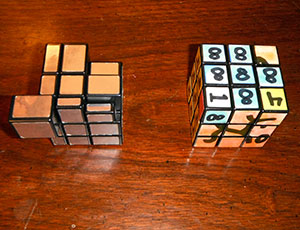Home
Young man, in mathematics you don't understand things. You just get used to them.
- John von Neumann

If I had heard this quote of Von Neumann's[1] when I was in grade school, I might have been upset. I might have thought that the person who said it felt that math is not something you can understand, but simply something that you get used to by rote memorization or some other scenario resulting in kowtowing to our mathematical overlords. While I now embrace these same overlords, I choose to believe that John Von Neumann meant something a little subtler.
John Von Neumann was likely referring to the mysterious and inherently incomprehensible nature of Mathematics. The image of mathematics by many people, especially the image promoted to people in K-12 education, is that Mathematics is a subject that is logical and that there is always a right answer (as opposed to say art. where the image is that there is no right answer and creativity rules). However, everyone I have ever met or heard of that has dedicated most of there lives to “understanding” math has come to the conclusion that creativity is the most important thing in “understanding” or “getting used to” mathematics.
Mathematics seems to have a mind of its own, and she always is cleverer than we could dream to be. This belief is even held by most mathematicians and philosophers who think that mathematics is strictly a man made construction that we invent instead of discover (these people are some times called formalists). It is hard to express this inclination that mathematicians have without using metaphors, but in essence mathematics has as much in common with art as it does with science. It is ultimately a human activity, and trying to understand it or predict an answer to an unknown problem in math is as good as guessing. And guessing takes creativity.
The aspect that some people find paradoxical about the creative nature of mathematics is that there does seem to be a “right answer”. How can we be creative when we are constrained to “reality”? I have thoughts on this matter, and I think many in literature have had the same feelings about writing that mathematicians have had about math [for example see Oulipo and the works of Jorge Luis Borges]. Though I would love to discuss some of my thoughts here, I will have to wait another time. Needless to say it is sort of a mystery. Naturally I am over simplifying many things, but there are countless writings on similar topics - sadly many of them are not well known by non-mathematicians. One of the more well known ones can be found here.
This website is my attempt to help bring some possibly lesser-known perspectives on what math is, and maybe what it is not, to any one who happens to find it.
So to sum it all up: contrary to the website's title, I do feel that there are aspects of math that we can understand, but if you study it long enough almost surely you will find something that you find confusing. It is hard to contemplate the amount of math that is known today, let alone how much newly discovered (or invented) math there is every year. It is too broad for a single person to grasp it all, so surely there will always be aspects that you don't understand. I wish to say that people should embrace this ignorance. It seems common to be scared of being wrong, and to shy away from subjects we don’t get the right answers immediately. I wish to help make it clear that math is another field where being wrong and learning from mistakes is a vital part of the process, and the more you accept that, the more you will learn.
Please note: I absolutely feel Math is a creative act, but like art, literature, or science, it takes lots of practice and hard work to become an expert. The only way to “understand” is to grasp a little more all the time, and to stay motivated by finding what you find fascinating. I hope I can bring to light some of the lesser-known aspects of math that I found fascinating and helped me feel that I sort of “understand”.
[1] A little history about Jon Von Neumann - Few will argue with the claim that Jon Von Neumann was a mathematical genius. Almost none of his contemporaries were as active in as many different subjects of mathematics as he was, however he was polymath and revolutionized many fields outside of mathematics, as well. Keith Devlin has called him the father of the modern computer [cite]. George Pólya, who is often considered one of the most creative mathematicians of his time once said, “John von Neumann was the only student I was ever afraid of.” If anyone during his time understood mathematics, surely it was Jon Von Neumann, so what could he have meant by this quote? Just to put things into perspective - these words of math's fickle nature came from the lion's mouth in some sense. [back]
